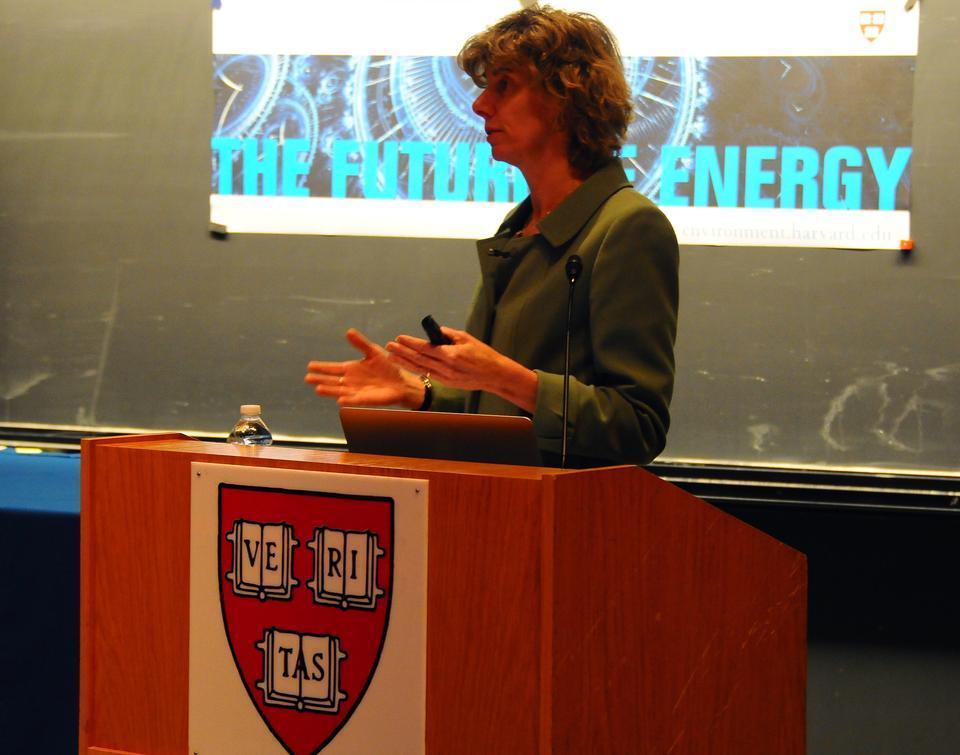
News
Summers Will Not Finish Semester of Teaching as Harvard Investigates Epstein Ties

News
Harvard College Students Report Favoring Divestment from Israel in HUA Survey

News
‘He Should Resign’: Harvard Undergrads Take Hard Line Against Summers Over Epstein Scandal

News
Harvard To Launch New Investigation Into Epstein’s Ties to Summers, Other University Affiliates

News
Harvard Students To Vote on Divestment From Israel in Inaugural HUA Election Survey
NRC Chair Talks Nuclear Regulation

Allison Macfarlane, chairman of the Nuclear Regulator Commission, argued that NRC oversight of U.S. nuclear technology is important for ensuring the adequate protection of public health and safety.
“As the Nuclear Regulatory Commission, we don’t prognosticate or predict the future of nuclear energy or have a stake in it,” Macfarlane said. “We don’t promote nuclear energy; we simply oversee the existing facilities.”
Macfarlane provided examples of recent nuclear disasters, such as the Fukushima plant, to argue for the importance of adequate preparation in dealing with potentially dangerous nuclear materials. She said that one of the most important elements of regulating nuclear reactors is to make sure the reactors have a constant supply of electrical energy in order to power their air conditioning systems and avoid meltdown.
In the case of Fukushima, Macfarlane said that the earthquake, which was one of the largest in history and caused excessive flooding, prevented back up generators from being able to power the core cooling systems.
“Nuclear regulation is something we can’t ever get lax about. We have to continually be on the ball, making sure that our licensees are acting safely and securely,” she said. “We need to make sure that we are up to date with our information.”
Macfarlane also said that, in light of both natural disasters and terrorist threats, the NRC has increased evaluations of protection from excessive inundation, seismic activity, and nuclear sabotage.
The lecture was the first of a series hosted by the Future of Energy initiative at Harvard, which seeks to unify members of the Harvard community to create a dialogue about energy related issues.
Manoj Easaw, a student at the Harvard School of Public Health who attended the talk, said he came to hear Macfarlane’s “thoughts on putting our resources in an energy source we don’t know the long term outcomes of.”
Easaw added that the use of a resource with a large potential for danger troubles him.
But other attendees said that they believe the benefits of nuclear energy outweigh the risks.
“It’s an efficient fuel and you better get used to it,” said A. Egon Cholakian, a graduate of Harvard Law School who was also in attendance.
—Staff writer Indrani G. Das can be reached at idas@college.harvard.edu. Follow her on Twitter @IndraniGDas.
This article has been revised to reflect the following correction:
CORRECTION: March 11, 2013
An earlier version of this article incorrectly referred to the type of system that Allison Macfarlane, chairman of the Nuclear Regulator Commission, said is powered by electrical energy in a nuclear reactor. In fact, Macfarlane referred to core cooling systems, not air conditioning systems.
Want to keep up with breaking news? Subscribe to our email newsletter.
